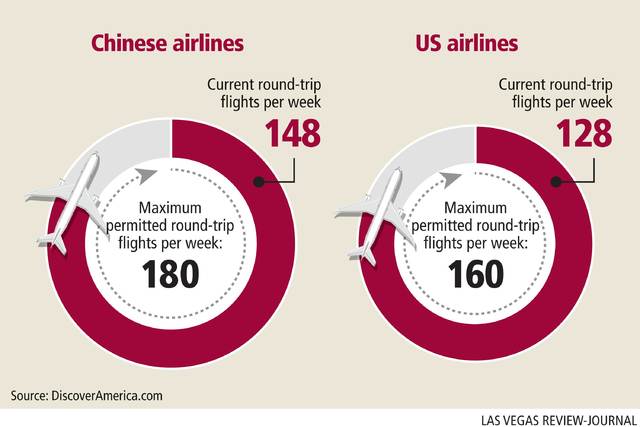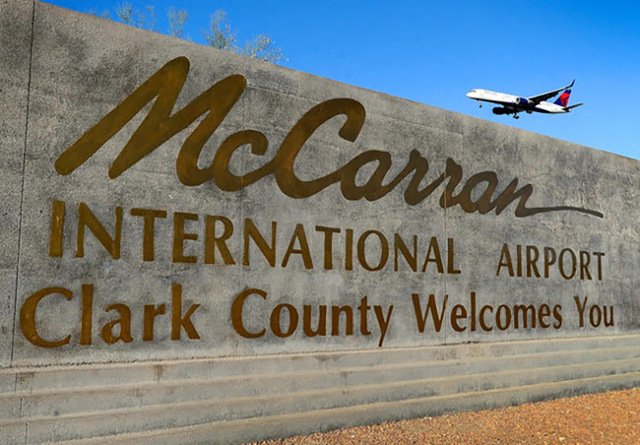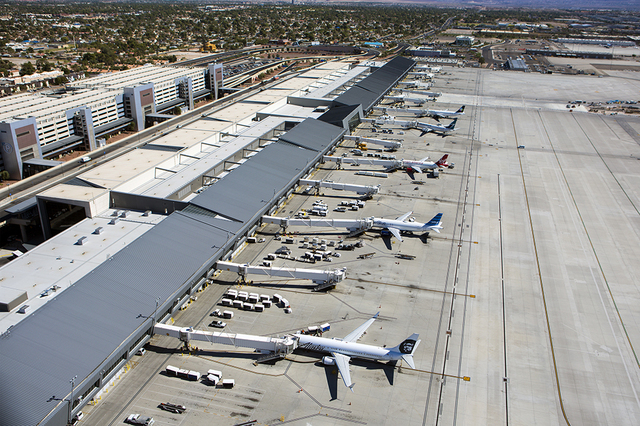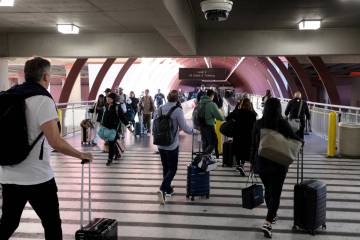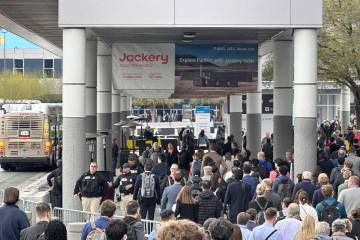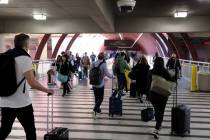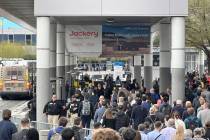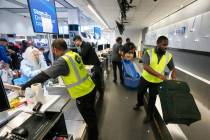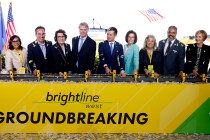Las Vegas travel officials nudge US government for more China flights
Las Vegas tourism officials are about to get cozier with the federal government, angling to get more nonstop airline routes between China and Las Vegas.
Chinese demand for U.S. travel is picking up, and local tourism officials want to draw as many high-spending Chinese travelers as possible to Las Vegas.
The idea of increased point-to-point service might mean rattling the feathers of Airlines for America, one of the top lobbyists for its member airlines, including American, United and Southwest.
The big airlines would rather see travelers go through their “hub-and-spoke system,” in which travelers would arrive at a major U.S. airport hub and then take a partner airline to get to a place such as Las Vegas, said Chris Jones, chief marketing officer for McCarran International Airport.
When asked about Jones’ comment via email, Vaughn Jennings, a spokesman for Airlines for America, did not directly address the issue. He said, “The most important factor in determining routes is demand and if there is adequate demand for nonstop service from Las Vegas to China.”
PUSHING POLICY
It is going to require some policy changes for any U.S. city to get additional flights from China’s top three economic hubs: Beijing, Shanghai and Guangzhou.
The number of flights between the the United States and first-tier Chinese cities is limited. China and the United States have a treaty restricting the number of flights between them, and both countries are already brushing up against their flight ceilings.
There are fewer than 3.6 million nonstop seats now available from first-tier Chinese cities to the United States, according to Brand USA, the destination-marketing organization for the United States. Hainan Airlines, the largest privately owned Chinese airline, began nonstop service on Dec. 2 between Beijing and Las Vegas, its eighth gateway city in North America.
Las Vegas travel officials say they would like to see an Open Skies agreement between China and the United States, which would nix travel caps all together.
“We have always been supportive of Open Skies. Competition is what makes the economy go, competition is what drives all of the industry to provide the services that you need,” said Rossi Ralenkotter, president and CEO of the Las Vegas Convention and Visitors Authority.
Ralenkotter said the convention authority, McCarran and the U.S. Travel Association, among other groups, have been lobbying Congress for an Open Skies agreement for years. Now, he said, he has a new tool to push an agreement forward.
On Nov. 10, U.S. Transportation Secretary Anthony Foxx named Ralenkotter the chairman of the National Advisory Committee on Travel and Tourism Infrastructure.
Ralenkotter said the committee will be working to suggest transportation and infrastructure improvements directly to the Transportation Department, which he hopes will include an Open Skies recommendation for China and the United States.
“For the first time we have a seat at the table when it comes to transportation discussions,” he said. “It’s another opportunity for us to position the travel industry.”
Ralenkotter attended the first committee meeting in Washington on Thursday and Friday.
He said working toward an Open Skies agreement between the two countries is an “ongoing effort.”
“We need to create a situation that the entry of all air carriers into markets needs to have that open competition,” he said.
But Jennings said that “competition is alive and well in the airline industry” and that Airlines for America supports the U.S. government’s decision “not to pursue further air services liberalization with China, until it honors the existing bilateral agreement.”
For China to honor that agreement, Jennings said, the country would need to allow U.S. airlines to “efficiently” move cargo within China and allow “U.S. carriers to secure commercially viable slot times at major Chinese airports,” among other requirements.
FLYING AROUND BARRIERS
Although the current cap on U.S. air travel to first-tier Chinese cities is on the minds of Las Vegas and U.S. travel officials, it creates an opportunity for second and third-tier Chinese cities, which still have millions of people able and willing to travel to the United States.
“If you go outside of those top three markets (Beijing, Shanghai and Guangzhou), then there’s much more availability for additional service,” Jones said.
“We were in a city called Chengdu in September for a conference — I never heard of Chengdu before we were planning on going to this conference. It’s a city of 14 million people, and this is a secondary city. So there are a lot of other markets outside of the big three in China that have flexibility to add service from.”
Jones said airlines are waiting for somebody to prove that servicing second- and third-tier cities works.
United Airlines recently added nonstop flights from the United States to the Chinese cities of Chengdu, Xi’an and Hangzhou.
Hainan Vice President Hou Wei, who has worked on establishing the Las Vegas route for two years, said he is taking a wait-and-see approach.
“We will see first if the market meets the expectation,” Wei said. The immediate next steps will be to increase flights from Beijing and “perhaps consider” offering service from Shanghai, he said.
Contact Nicole Raz at nraz@reviewjournal.com or 702-380-4512. Follow @JournalistNikki on Twitter.





